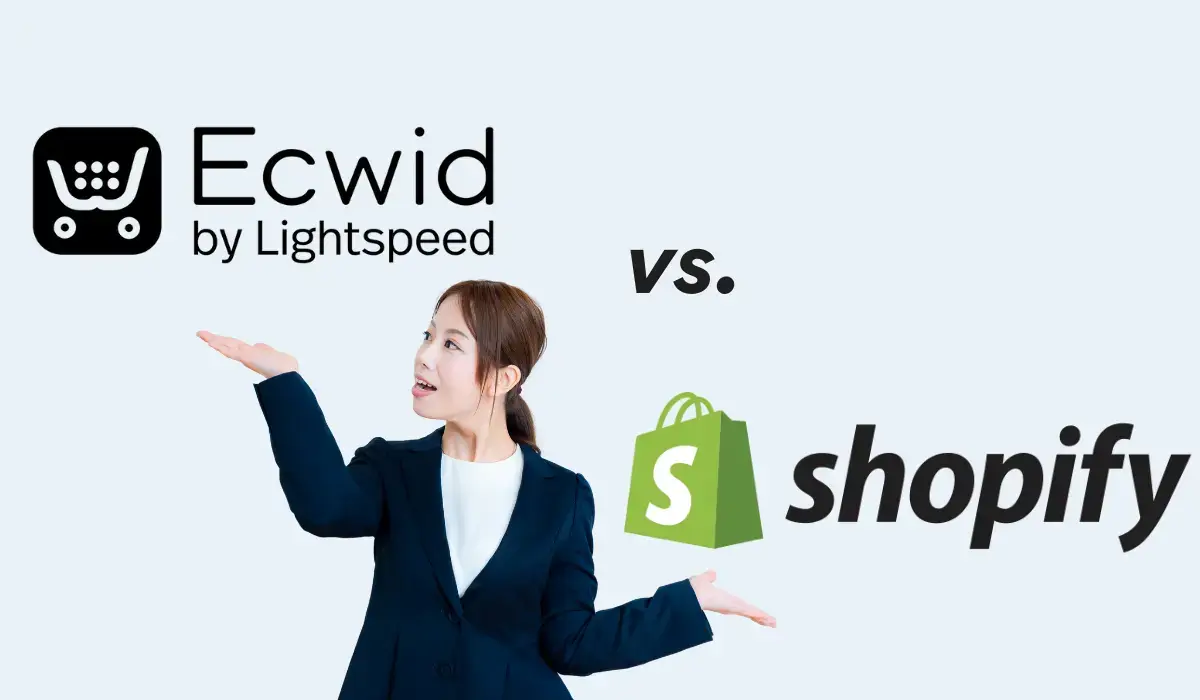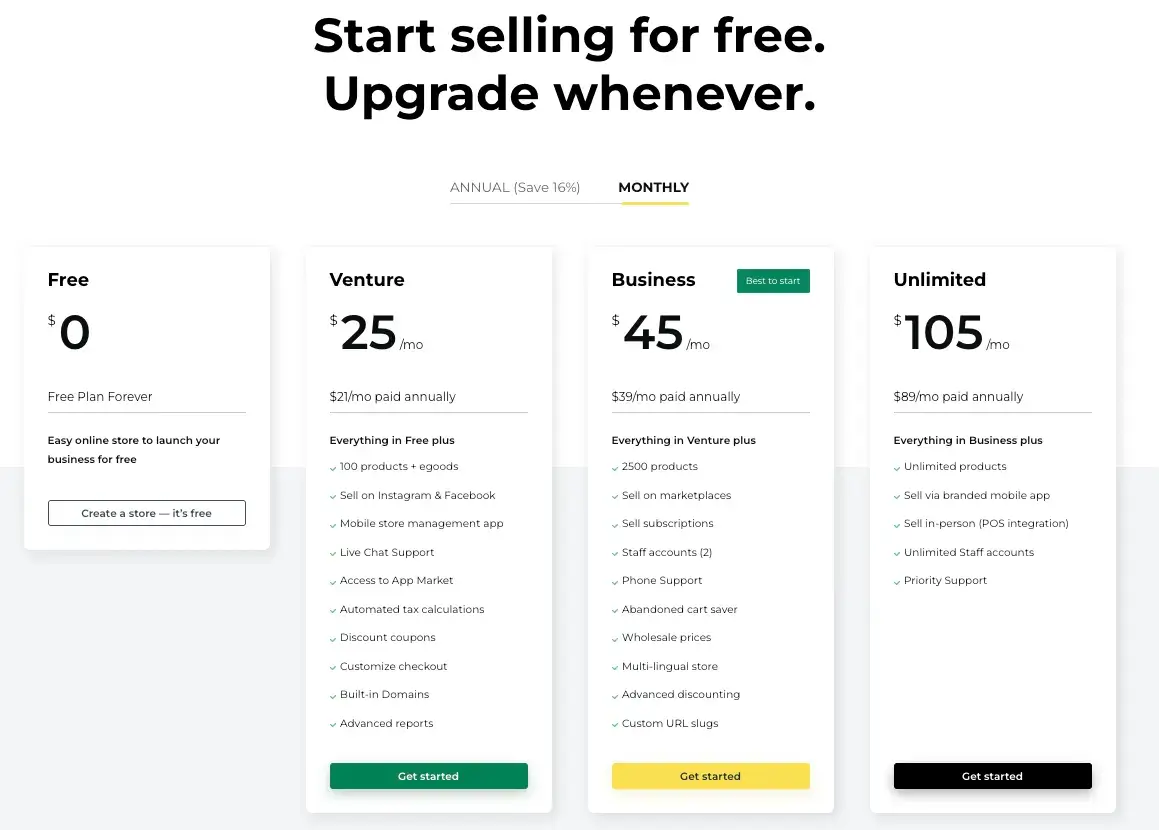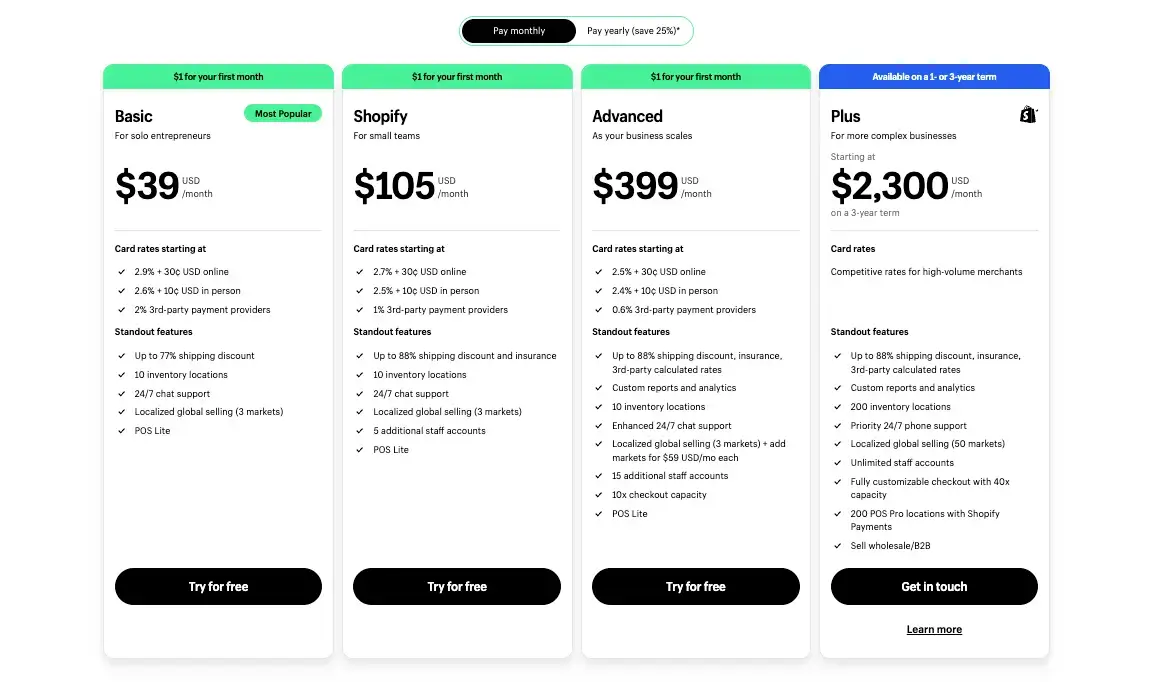As an expert in e-commerce, I've seen firsthand how crucial it is to choose the right eCommerce platform when starting or scaling an online business. Shopify and Ecwid are two of the most popular options, but determining which is best can be challenging.
Drawing from our extensive experience at POWR working and integrating with both platforms, I'll guide you through a comprehensive comparison of Ecwid and Shopify.
We'll examine key aspects such as pricing, features, ease of use, and integrations – areas where our POWR software seamlessly works with both platforms.
By the end of this article, you'll have the insights needed to decide which eCommerce solution aligns best with your business goals and requirements.
Shortcuts:
- Overview: Ecwid and Shopify
- Pricing
- Features
- Ease of Use
- Payment Options and Fees
- SEO and Marketing Tools
- Third-Party App Markets
- Drawbacks and Limitations
- Customer Support
- FAQs: Ecwid vs Shopify
- Final Recommendation: Ecwid or Shopify

1. Overview: Ecwid and Shopify
-
Ecwid Overview
Ecwid, short for "eCommerce Widget," is an eCommerce platform that can easily integrate with an existing website, social media, or other online marketplaces.
Ecwid by Lightspeed is often used by small to medium sized businesses looking to add a store to an existing website rather than build one from scratch.
Its plugin-based approach allows for seamless integration with popular content management systems like WordPress, Wix, and Joomla, making it an attractive option for businesses that already have an established online presence.
Additionally, Ecwid's multi-channel selling capabilities enable businesses to manage their inventory and orders across various platforms from a single dashboard, streamlining the eCommerce process for busy entrepreneurs.
-
Shopify Overview
Shopify is a comprehensive eCommerce platform that allows you to build and manage your online store from scratch.
Shopify is widely regarded as one of the most versatile and powerful tools for entrepreneurs and businesses that want to scale their online presence.
It offers a full suite of tools for website building, inventory management, order processing, and customer relationship management, making it a one-stop solution for eCommerce needs.
Shopify's extensive app marketplace and robust API allow for significant customization and expansion of functionality, enabling businesses to tailor their online stores to meet specific requirements as they grow.
Also, Shopify's built-in analytics and reporting tools provide valuable insights into sales trends, customer behavior, and overall store performance, empowering businesses to make data-driven decisions.
2. Pricing: Ecwid vs Shopify
|
Platform |
Pricing Plans |
Free Plan |
Additional Fees |
|
Ecwid |
Free, $25/mo, $45/mo, $105/mo. Discounts on annual subscriptions |
Yes, limited features |
No transaction fees (except for payment gateway fees) |
|
Shopify |
$39/mo, $105/mo, $399/mo, $2300/mo on a 3-year term. Discounts on annual subscriptions |
No |
Shopify has additional transaction fees unless using Shopify Payments |
-
Ecwid Pricing
Ecwid pricing offers a free plan with limited features, making it accessible to smaller businesses or those just starting.
Paid plans range from $25 to $105 monthly, more affordable than Shopify's offerings. Ecwid does not charge transaction fees, though you will still pay fees to your payment processor.
-
Shopify Pricing
Shopify offers tiered pricing based on business needs, starting at $39 monthly.
Shopify also charges additional transaction fees if you use a third-party payment provider, though Shopify Payments can help you avoid these fees.
Shopify’s plans tend to be more expensive, especially for businesses just starting.
3. Features: Ecwid vs Shopify
|
Feature |
Ecwid |
Shopify |
|
Ease of Setup |
Easy to integrate with existing websites |
Full store builder, requires setup |
|
Product Limit |
Free plan: 10 products, Paid: Unlimited |
Unlimited on all plans |
|
POS System |
Limited, requires additional integrations |
Full POS system available with all plans |
|
Multi-Channel Selling |
Yes, integrates with websites, Facebook, Instagram, Amazon |
Yes, integrates with Facebook, Instagram, Amazon, eBay |
|
Themes & Customization |
Limited customization options |
Hundreds of themes, deep customization |
-
Ecwid Features
Ecwid shines when it comes to adding eCommerce functionality to existing websites. It integrates well with platforms like WordPress and Joomla and supports selling through social media.
However, customization and built-in features like Point of Sale (POS) systems are more limited compared to Shopify.
-
Shopify Features
Shopify offers more robust features, especially for businesses looking to scale.
From robust POS systems to built-in marketing tools and advanced customization options, Shopify is designed for merchants who want to grow and sell across multiple channels.
4. Ease of Use: Ecwid vs Shopify
-
Ecwid
Ecwid is extremely easy to set up and integrates well with existing websites.
Ecwid is an excellent choice for quickly selling online without rebuilding your website if you already have a website or blog. It’s ideal for smaller operations with limited product catalogs.
-
Shopify
Shopify is also known for its ease of use but requires more setup if starting from scratch.
The platform offers a drag-and-drop store builder, and once set up, managing your store is straightforward. It’s great for businesses that plan to grow and need a platform that scales.
5. Payment Options and Fees: Ecwid vs Shopify
|
Platform |
Payment Options |
Transaction Fees |
|
Ecwid |
Integrates with over 50 payment providers, including Stripe and PayPal |
No extra transaction fees |
|
Shopify |
Shopify Payments + 100+ providers |
2% transaction fees unless using Shopify Payments |
-
Ecwid Payments
Ecwid allows you to integrate a wide variety of payment options, including Stripe, PayPal, and other third-party gateways, with no extra fees beyond what the payment processor charges.
-
Shopify Payments
Shopify supports over 100 payment providers but adds additional transaction fees (2%) unless you use Shopify Payments.
This can add up for larger businesses, but Shopify Payments can save on costs.
6. SEO and Marketing Tools: Ecwid vs Shopify
|
Feature |
Ecwid |
Shopify |
|
SEO Features |
Limited built-in SEO tools |
Advanced SEO options with built-in tools |
|
Marketing Integrations |
Limited, requires third-party apps |
Built-in email marketing, social integrations |
-
Ecwid SEO and Marketing
Ecwid provides basic SEO options like meta tags, URL customization, and basic analytics. However, you may need third-party integrations or apps for more advanced features.
-
Shopify SEO and Marketing
Shopify is known for its strong SEO capabilities, offering tools for optimizing product pages, URLs, and meta descriptions.
It also provides built-in marketing tools, including email campaigns and social media integrations.
7. Third-Party App Markets: Ecwid vs Shopify
|
Platform |
App Market Size |
Key Apps & Integrations |
Customization Potential |
|
Ecwid |
200+ apps |
Facebook, Instagram, Square, Xero |
Limited compared to Shopify |
|
Shopify |
8,000 apps |
Mailchimp, Quickbooks, HubSpot, Klaviyo |
Extensive customization options |
-
Ecwid App Market
Ecwid offers a curated selection of over 200 apps in its marketplace. These apps cover essential functions like shipping, accounting, marketing, and social media integrations.
Popular integrations include platforms like Facebook, Instagram, and accounting tools like Xero.
However, the smaller size of the app market means fewer niche tools or deep customization options, which may limit businesses with more complex needs.
POWR currently has six apps available for free (with six more planned) on the app marketplace:
-
Shopify App Market
Shopify’s app marketplace is significantly larger, with over 8,000 apps available. Whether you need advanced marketing tools, analytics, customer service plugins, or specialized eCommerce apps, Shopify offers a broad range of third-party integrations.
Popular apps include Mailchimp, QuickBooks, and Klaviyo for email marketing, among many others.
Shopify’s vast app market allows for extensive customization and scalability, making it a more versatile option for businesses with diverse needs.
The list of POWR apps on Shopify totals 32, including Form Builder, Popup, Instagram Feed, and YouTube Gallery, among many others.
Third-Party App Customization: Ecwid vs. Shopify
-
Ecwid Customization
Ecwid’s app market allows basic customization through integrations with key services.
Still, the platform is designed to be simple and user-friendly, meaning customization options may be limited for larger businesses or those with specific requirements.
If you need advanced features, you may need to rely more heavily on external developers or third-party tools.
-
Shopify Customization
Shopify is highly customizable, with many apps offering deep integrations and the ability to extend your store’s functionality.
Shopify’s app market caters to small businesses and enterprises, from advanced marketing automation to customer service enhancements.
For businesses with unique needs, Shopify’s app ecosystem and open API make it possible to create tailored solutions without extensive development knowledge.
8. Drawbacks and Limitations: Ecwid vs Shopify
While both Ecwid and Shopify offer robust eCommerce solutions, they each have their own set of limitations that potential users should consider:
Ecwid Drawbacks:
- Limited Design Flexibility: Ecwid's design options are more restricted than Shopify's, which may be a drawback for businesses wanting a highly customized store appearance.
- Less Scalable: For rapidly growing businesses, Ecwid may not offer the same level of scalability as Shopify, particularly in terms of advanced features and integrations.
- Dependent on Existing Website: Ecwid is primarily designed to integrate with existing websites, which might be a limitation for businesses starting from scratch.
- Limited Built-in Marketing Tools: Unlike Shopify, Ecwid has fewer built-in marketing and SEO tools, potentially requiring more third-party integrations.
Shopify Drawbacks:
- Higher Costs: Shopify's plans are generally more expensive than Ecwid's, which could be a barrier for small businesses or startups.
- Transaction Fees: Unless using Shopify Payments, users face additional transaction fees, which can add up for high-volume sellers.
- Steeper Learning Curve: While user-friendly, Shopify's extensive feature set can be overwhelming for beginners compared to Ecwid's simpler interface.
- Theme Customization Limitations: While Shopify offers many themes, extensive customization often requires knowledge of Shopify's proprietary Liquid coding language.
- Content Management Limitations: Shopify's blogging and content management capabilities are less robust than those of dedicated CMS platforms, which might be a drawback for content-heavy stores.
Understanding these limitations can help you make more informed decisions based on their needs and long-term goals.
9. Customer Support: Ecwid vs Shopify
|
Platform |
Support Channels |
Availability |
|
Ecwid |
Email, live chat, phone (on higher plans) |
24/7 on paid plans |
|
Shopify |
24/7 support via chat, email, phone, and forums |
24/7 availability on all plans |
Frequently Asked Questions (FAQ): Ecwid vs Shopify
1. How do Ecwid and Shopify compare for website integration?
Ecwid is designed to integrate easily with existing websites, including WordPress and custom HTML sites.
Shopify, while primarily a standalone platform, offers integration options through its "Buy Button" feature or as a headless commerce solution.
For adding e-commerce to an existing site, Ecwid often has the edge, while Shopify excels as an all-in-one solution.
2. Which is easier to use: Ecwid or Shopify?
Both Ecwid and Shopify are user-friendly, but Ecwid tends to be simpler for beginners, especially when adding to an existing site.
Shopify offers more features that are ‘out of the box,’ providing more room for growth but with a steeper learning curve.
3. How do Ecwid and Shopify compare in terms of transaction fees?
Ecwid doesn't charge additional transaction fees beyond payment processor fees. Shopify charges extra transaction fees (0.5% to 2%, depending on your plan) unless you use Shopify Payments. For businesses sensitive to transaction costs, Ecwid may have an advantage.
4. Can I sell on social media with both Ecwid and Shopify?
Yes, both Ecwid and Shopify support selling on platforms like Facebook and Instagram and marketplaces like Amazon and eBay. Their




